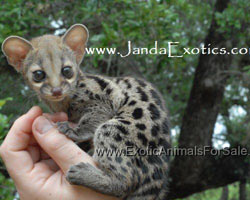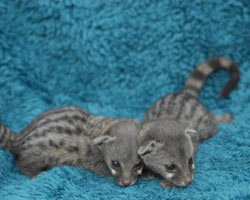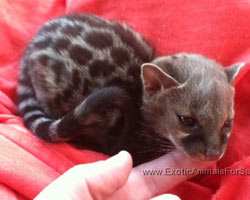Genets For Sale



Genets, native to Africa, are long, slender, cat-like animals with large ears, ringed tails and partially retractable claws. Their fur is spotted with a dark stripe down their spine. There are the only member of the viverrid family that are able to stand on their hind legs. Although they live on the ground, they spend a great deal of time in trees. Genets have been introduced into parts of Europe where they can still be found in the wild. They have been kept as pets for more than 1,500 years.

Safari
- Name: Tina
- Posted: 11/13/2023
- Phone: 864-254-8734
- Email: Email Seller
- Location: South Carolina
F3 Safari male kitten. 5 weeks old. He is a real cutie. TICA registration. 1 year genetic health guarantee. Please inquire

Bison calves
- Name: Phillip Licking
- Posted: 10/28/2023
- Phone: 3086500162
- Email: Email Seller
- Location: Nebraska
,three spring bison calves for sale in central Nebraska. Ranch raised have white genetics in them

Bison calves
- Name: Phillip Licking
- Posted: 10/28/2023
- Phone: 3086500162
- Email: Email Seller
- Location: Nebraska
,three spring bison calves for sale in central Nebraska. Ranch raised have white genetics in them
Genet
Genets in Captivity
Genets should be kept in a large, secure enclosure. Cages designed for ferrets work nicely because they are mutli-leveled with small bar spacing. Genets should not spend all their time in a cage, though. They should be allowed out, on a harness and leash, so they can enjoy the sunshine and fresh air.
what do Genets eat?
Genets are considered to be opportunistic omnivores, which means they will hunt and eat both invertebrates and small vertebrates, including grasshoppers, fish, snakes, rodents, eggs, and insects. But they also eat fruits and plants. Although they are not members of the cat family, genets have similar dietary needs to cats. High-quality cat foods can be used to supplement a more natural diet. Frozen rodents that are sold to reptile owners can be given to genets, in addition to vegetables and fruits.
Genet Enrichment
Agile climbers, genets love to scamper up trees and climb onto shelves, rocks and ledges. They like to explore and will push their way into small openings to get a look around. They are typically solitary animals in the wild, but do seem to benefit from interactions with their keepers.
Breeding Genets
The only time genets interact with other genets is during mating season. Female genets generally reach sexual maturity at around two years of age and, after that, will give birth twice a year, in the spring and in the fall. The gestation period is ten to eleven weeks and the female will give birth to a litter of, on average, five babies. Genets in the wild have a life expectancy of about 13 years, but can live much longer in captivity.







Comments